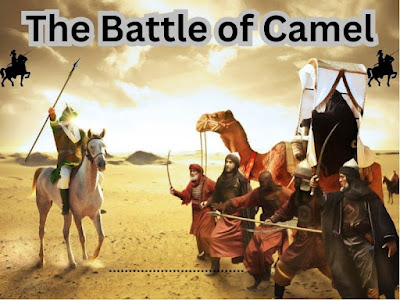The Battle of Camel, also known as the Battle of Jamal, was a pivotal event in the history of early Islam. This intense combat occurred in 656 CE along the Euphrates River, and it was a watershed moment in the power struggle that followed the killing of Islam's third caliph, Uthman ibn Affan (R.A). The conflict pitted two notable personalities against one other: Aisha Bint Abu Bakr (R.A), the Prophet Muhammad's (Peace Be Upon Him) loving wife, and Ali ibn Abi Talib (R.A), the Prophet's (Peace Be Upon Him) cousin and son-in-law and the fourth caliph of Islam. This page provides a detailed account of the Battle of Camel, including its historical backdrop, the causes for the fight, the principal players engaged, and the aftermath. The Battle of Camel pitted two notable personalities against one other: Aisha Bint Abu Bakr (R.A), the Prophet Muhammad's (Peace Be Upon Him) loving wife, and Ali ibn Abi Talib (R.A), the Prophet's (Peace Be Upon Him) cousin and son-in-law and the fourth caliph of Islam. This page provides a detailed account of the Battle of Camel, including its historical backdrop, the causes for the fight, the principal players engaged, and the aftermath.
The Battle of Camel Historical Context and Causes
To comprehend the Battle of Camel, one must first comprehend the context in which the event occurred. Following the killing of Uthman ibn Affan (R.A) in 656 CE, the Muslim community was left with a leadership void, which led to conflicts and turmoil. The assassination of Uthman (R.A), which was motivated by many sociopolitical grievances and power struggles, resulted in the formation of factions among Muslims.
One side, known as the Shi'a, supported Ali ibn Abi Talib's (R.A) claim to the caliphate, claiming that he was the Prophet Muhammad's (Peace Be Upon Him) rightful successor and that leadership should remain within the Prophet's (Peace Be Upon Him) family. The Umayyads and their followers, on the other hand, preferred a more traditional method to leadership succession, arguing for a caliph chosen by the Muslim community through consultation (shura).
Main Characters in the Battle of Camel and Their Roles
The caliphate was indeed granted upon Ali ibn Abi Talib (R.A) in the aftermath of Uthman's (R.A) death. His leadership, however, was met with early opposition from certain powerful figures within the Muslim community, particularly those with ties to the Umayyad family.
Aisha Bint Abu Bakr (R.A), the Prophet Muhammad's (Peace Be Upon Him) wife and a well-known personality among early Muslims, did not originally reject Ali's (R.A) leadership. However, when dissatisfaction with Ali's (R.A) handling of the aftermath of Uthman's (R.A) assassination increased among some factions, Aisha (R.A), along with other notable personalities such as Talha ibn Ubaydullah and Zubair ibn al-Awam, began to voice their concerns.
Their main demand was for justice in the assassination of Uthman (R.A), and they believed Ali (R.A) was not doing enough to bring the criminals to justice. Their discontent eventually grew into a full-fledged resistance, resulting in the establishment of a coalition against Ali's (R.A) leadership.
The Battle of Camel Begins
The conflict between the two factions reached a climax in 656 CE, when the forces of Aisha (R.A), Talha, and Zubair, together with their supporters, clashed with Ali's (R.A) forces near the Camel (Jamal) in Basra, Iraq. The conflict, which pitted erstwhile friends and followers of the Prophet Muhammad (Peace Be Upon Him) against each other, was a painful spectacle for the Muslim community.
The specifics of the conflict are beyond the scope of this essay, but it's important to note that, despite deep divisions and tremendous emotions, both sides shown remarkable gallantry and fortitude. The combat lasted a day and resulted in severe deaths on both sides.
The Repercussions and Impact on the Muslim Community
For the early Muslim community, the Battle of Camel had far-reaching implications. While Ali (R.A) triumphed on the battlefield, the conflict's aftermath left severe scars that would continue to influence Islamic history. The most immediate consequence was the death of numerous notable companions of the Prophet Muhammad (Peace Be Upon Him) during the battle, including Talha ibn Ubaydullah and Zubair ibn al-Awam.
Despite her defeat, Ali (R.A) treated Aisha (R.A) with dignity and honor, and she was safely transported back to Medina. This gesture was intended to bridge divides and maintain harmony within the Muslim community.
The conflict, however, widened the gap between the Shia and Sunni factions. Ali's (R.A) supporters saw him as the rightful leader and his opponents as rebels, whilst the Umayyads and their allies viewed Ali's (R.A) succession with mistrust, arguing that leadership should not be limited to the Prophet's (Peace Be Upon Him) family.
Ali ibn Abi Talib's (R.A) Caliphate
Following the Battle of Camel, Ali's (R.A) position as caliph was further strained by the emergence of a new foe, the Kharijites. The Kharijites were a radical group that initially backed Ali (R.A) but then turned against him after disagreeing with his arbitration during the conflict of Siffin (a later conflict between Ali (R.A) and Muawiya (R.A), the governor of Syria).
This internal disagreement and opposition, combined with the Umayyad challenges, rendered Ali's (R.A) caliphate chaotic and challenging. In 661 CE, Ali (R.A) was slain by a Kharijite, effectively terminating his authority and paving the way for the foundation of the Umayyad Caliphate.
Lessons Learned and Historical Legacy
The Battle of Camel is a sobering reminder of the intricacies and difficulties of early Islamic history. It serves as a historical lesson, emphasizing the perils of internal warfare and the implications of political strife within a religious society.
The struggle also highlights the importance of smart leadership, unity, and consultation (shura) in governing a heterogeneous group like the early Muslims. The lack of a defined succession system, along with personal ambitions and political objectives, resulted in a catastrophic clash that could have been avoided with improved communication and understanding.
Conclusion
The Battle of Camel was a watershed moment in Islamic history that shocked the Muslim world and changed the trajectory of Islamic history. The struggle was caused by a complex interaction of political, social, and theological elements, which had a profound and long-lasting impact on the early Muslim community. The fight exacerbated sectarian divides, resulting in the formation of the Shia and Sunni factions, and contributing to the instability that followed under Ali ibn Abi Talib's (R.A) reign.
As we reflect on this historic conflict, we must learn from history and strive for unity, tolerance, and collaboration within the unique fabric of the Islamic community. Understanding the events and their underlying causes can assist us in navigating the intricacies of today's difficulties and fostering a more harmonious and enlightened future.
FAQ
Q: What is the story of the Battle of camel?A: The Battle of Camel occurred in 656 CE along the Euphrates River in response to the assassination of the third caliph, Uthman ibn Affan (R.A). Ali's (R.A) rule was contested by Aisha (R.A), Talha, and Zubair, who demanded justice for Uthman's death. The quarrel culminated in a sad struggle amongst Prophet Muhammad's (Peace Be Upon Him) erstwhile friends.
Q: Why did Ali (R.A) and Aisha (R.A) fight?A: After Uthman's (R.A) assassination, Ali (R.A) and Aisha (R.A) argued over their conflicting perspectives on leadership. Ali's (R.A) actions dissatisfied Aisha (R.A), Talha, and Zubair, who sought accountability, resulting in a conflict.
Q: Why did Ali (R.A) and Muawiya (R.A) fight?A: The battle between Ali (R.A) and Muawiya (R.A) developed from political issues. Muawiya (R.A), a major Umayyad family member, opposed Ali's (R.A) reign and sought vengeance for Uthman's assassination, ending in the Battle of Siffin in 657 CE.
Q: What did Prophet Muhammad (Peace Be Upon Him) say about Muawiya (R.A)?A: Muawiya (R.A) was regarded in great respect by Prophet Muhammad (Peace Be Upon Him), who prayed for Allah's mercy on him and his mother upon their conversion to Islam. Early Muslim conceptions of Muawiya (R.A) were affected by this beneficial association.
Q: Who opposed Hazrat Ali (R.A)?A: Hazrat Ali's (R.A) reign was opposed by Aisha (R.A), Talha, Zubair, and the Kharijites. They questioned his leadership for a variety of reasons, adding to the difficulties he encountered during his reign.


-min.jpg)

-min.jpg)








